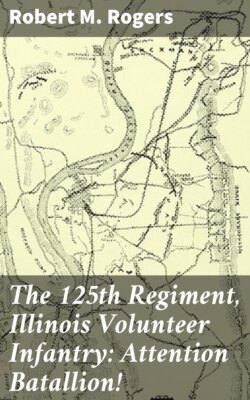Читать книгу The 125th Regiment, Illinois Volunteer Infantry: Attention Batallion! - Robert M. Rogers - Страница 16
На сайте Литреса книга снята с продажи.
CHAPTER XIV.
ОглавлениеTable of Contents
Our regiment was finally placed in camp on top of some high hills in the western part of the city, behind fortifications of cotton bales. It brought to our mind what we had read about Jackson at New Orleans. On the top of these hills, commanding an extensive view of the surrounding country, we pitched our tents. We had issued to us the style of tent called the "Sibley;" patterned after the wigwams of the Indians, conical shape, with a large hole in the top to permit the escape of smoke. The tent pole consisted of a wooden staff four or five feet long, which rested, at its base, on an iron tripod of about three feet in height. Between the legs of this tripod we made our fires, fuel being provided by the quartermaster's department. At night when we had spread down our blankets inside of the tents, which were intended to accommodate twenty-five men each, we lay with our heads to the outside of the circle, and our feet pointing to the fire. It was pretty close packing, but we were good natured for the most part, and so we got along very well, although, occasionally, some fellow would make a fuss, but it was soon stopped by everybody else yelling at him to keep still, and yielding to public opinion so emphatically expressed, the disturber of the peace would smother his injuries, fancied or real, in his own breast, and sleep would soon settle down upon our household.
While in camp on these hills, some of the friends of boys of our company, came to visit them. Solomon Starr, John Huffman, uncle Archie Gryder and several others. We were all glad to see them, and in fact it made no particular difference who they had come to visit, we were all glad to see them, for we were nearly all acquainted with them; at any rate they had come from what we called "God's country," and they were heartily welcomed. They said they wanted to see how "soldiering went," so we fed them well on what we had, not forgetting to supply them liberally with that delicious dish which some one had named "s—of a b—;" where in the world he ever got the name from we never could find out, or why it should have been thus named, for it certainly bore not the slightest resemblance to any member of the canine race. This beautiful dish, in order that all may know how it was prepared, was made as follows: hardtack broken up into small pieces, and then fried or boiled in grease and water until it has swelled, and become as tough almost as india-rubber. This is what we regaled our guests with, and they accepted it with credulity. At night we would scatter them around in the different tents, as it was impossible to keep them all in one without putting us to great inconvenience. So one night there came up a heavy storm of wind and rain, and the water flowed through the tents, soaking our blankets and everything else. Our guests left us in the morning, expressing themselves as being fully satisfied with their experience. "Soldiering was not so very hard," they said, "but then, at times, was inconvenient, and indeed they must hurry home, they had not intended to have staid nearly so long as they had, etc., etc." At this late day, whenever you meet one of them, and ask him if he remembers the night he passed in camp with us at Nashville, he will tell you with a groan that, "yes he believes he does remember something about it," and will always add: "you have reference to the night it rained so."
It was not long before Nashville seemed to rouse itself, and assume something like its former appearance, and to look as it had before war breathed its desolating breath upon the city. The stores were opened, the hotels commenced filling up, and as far as war was concerned, nothing was observable in the city to denote a state of war, or that the city was under martial law, except the passing of army wagons, or the tread of the provost guard. Order reigned, and protection from crime was given to all. The theatres were opened and played to full houses nightly; mostly officers and soldiers filled them, although generally there was a fair sprinkling of citizens in the audience. Pieces bearing directly upon the war, with strong union sentiments, were placed upon the boards, and the performance would be interspersed with songs of the most loyal character. One day there came an order for us to "strike tents." We had no idea of where we were going, but our march was not a long one, merely across the Cumberland to Edgefield, where we went into the old camp just vacated by the 16th Illinois. A more beautiful camp we had never seen. The quarters of the men were made of cane, which the 16th had procured some where in the neighborhood, and out of which they had contrived to make a camp, at once beautiful and artistic. All of the old boys will well remember it.
